- Home
- P. T. Deutermann
Sweepers Page 11
Sweepers Read online
Page 11
Lots of people, you know? Anyone who got anywhere near me ate steel.
This steel, right here. Men, women, children anyone. Five bloody weeks until I got into the outskirts of Saigon. And then I got arrested by the White Mice, who put me in a Chinese jail for a year in Cholon until they found somebody who would buy my ass out. All thanks to a bunch of chickenshit Swift boat guys. Like you.”
“I did what I had to,” Sherman had protested. “They were setting off mines. Lose the boat and nobody gets out.
I’m sorry it happened. But we had no choice.”
The SEAL had stared down at him with that one glaring eye, his ravaged face twisting in contempt.
“What do you want?” Sherman whispered.
“Want?” The SEAL leaned forward again. “I want revenge. I want to stick this knife through your hand and into this table here so you don’t go anywhere. Then I want to go upstairs and rape your wife and blind your kid, and then I want to come back down here and open up your belly with this knife and strangle you with your own guts. That’s what I want.
The knife had been lying on the table the whole time, right in front of him, but Sherman was transfixed in the chair, a watery feeling in his stomach, his mouth still arid.
And then with the swiftness of a rattlesnake, the man had him hauled up out of his chair and bent over the table, his right arm pinned behind his back by the SEAL’s knee in a bone-cracking arch, his face pressed down on the table by the SEAL’s left forearm, the edge of the table pressing hard against his windpipe. He could barely breathe, and then he felt, rather than saw, the cutting edge of that knife resting across the bridge of his nose about one millimeter from his eyes. The SEAL’s voice hissed in his ears.
“What do I want, Sherman? I want to pop your eyeballs out and make you eat them while the nerves are still attached. I want to drive twentypenny nails into your skull and wire them to your car battery. I want to jam your mouth open with a bent fork and put a black widow spider in there and piss her off. I want lots of fun shit for you and yours, Lieutenant, but guess what?-I’ve learned to wait for what I want.
I’ve learned to be a patient man. I’m going to wait some more. I’m going to wait until you have accumulated some things of real value. And then I’m going to make you pay for what you and your crew did to me, no matter how long it takes. You were the skipper, so you’re the Man.
You’ll never know when I’m coming. Until I tell you. And I will tell you, you son of a bitch. You will get one warming.”
His air shut off by the table’s edge, Sherman’s vision had gone red and his ears were roaring ominously. He had barely heard the small voice from the edge of the room. “Daddy?”
The SEAL had come off his back in an instant, leaving Sherman to slide off the table and onto the floor like a sack of potatoes, his mouth working but nothing coming out, all his muscles putty. Out of the corner of his eye, he could see that Galantz had grabbed his son, Jack, and was holding the petrified child off the floor with his good arm, growling at him like a wild animal, as if he was about to dash him against the wall.
Sherman had tried desperately to move, to get up, but he had been perfectly helpless, gagging on the floor, his nearly dislocated right shoulder preventing him from even beginning to get up.
And then suddenly, it was over. The terrified child was sobbing in the comer of the dining room, and Sherman was pulling himself across the floor to get to him. His wife had slept through it all, even when little Jack had begun to wail like a banshee in his arms. It had taken him an hour and a half to calm the child and get him back to bed. He had not awakened his wife. There seemed to be no point in her being terrified, too. He had gone back downstairs to get some brandy to steady his shaking hands and to close the front door, which was still standing wide open in the rain. He had nearly lost it again when he found the knife lying on the dining room table-a little reminder that it had all been real.
A little message from the SEAL: I don’t need the knife anymore. But you might.
Now Sherman’s eyes refocused and looked over at Mcnair. “I was mostly ashamed when it was all over.
Ashamed for what we had done back there in the Rung Sat.
Ashamed that I had been scared to death in this guy’s presence. Ashamed that I had been helpless to do anything when he had my son up against the wall like a rag doll.”
Karen ‘remembered to breathe, and she swallowed hard.
Mcnair, who had been listening intently, reopened his notebook.
“This was when, Admiral? And you’re sure this man’s name was Galantz?
Marcus Galantz?”
“In 1972. February. And I’m sure about the name.”
“And you’re sure this was Galantz?” Mcnair asked again, his face a study in concentration. Sherman said yes.
Sherman looked drained, as if the memories had emptied him of all energy. He was slumped in his chair like a teenager.
“Well, this of course makes a difference,” Mcnair said.
“The fact that he came back proves he lived through what happened out there in Vietnam.”
“If he was that disfigured, he should be easier to find, don’t you think?” Karen asked.
Train shook his head. “That was 1972. Cosmetic surgery has come a long way since then.” He turned to Sherman.
Admiral; is there a possibility that he was still in the Navy then? That he was on active duty?”
“I don’t think so.” He took a deep breath, as if trying to make the memories go away. But then he looked over at Mcnair. “I’ve told you this story because now I’m more convinced than ever that she was killed.
Elizabeth, I mean.
But the Navy would not take kindly to having this story get out.”
“It’s been over twenty years, Admiral,” Mcnair said.
“Why would it be. such a big deal if it comes out now?”
Sherman rubbed his face with both hands. “We left one of our own behind, Detective,” he said. “‘In the armed forces, that’s a big deal. You don’t abandon your wounded, and you sure as hell don’t leave a guy out there just because headquarters makes some assumptions. You go back and get him. Guys count on that, in return for which, they’re willing to fight and die.”
“I understand, Admiral,” Mcnair replied. “But if Miss. Walsh was indeed murdered, that takes precedence, don’t you think? What I’m saying is that you did the right thing in telling me this. I promise to be discreet about this matter.
Although, now that I think about it, we may have a small bureaucratic problem here.”
“Which is?”
“The department has several cases that are clear-cut homicides.
The admiral nodded slowly. “I think I understand. Cases where there is direct evidence of a crime, as opposed to evidence that isn’t there.”
“Something like that,” Mcnair said. “Our lieutenant isn’t convinced about this, although he doesn’t know what you’ve told me tonight. But right now from an evidentiary point of view, this one’s still sort of a reach.”
Sherman looked perplexed. “But-“
“Don’t get me wrong. I mean, we can work this thing, okay? But it will help a lot if the Navy can help us locate this Galantz. Turn him into a living, breathing human, instead of a missing letter and a story from some twenty years back.”
Everyone looked over at Train.
“As soon as we have anything at all I’ll get it to you,” Karen offered.
“And I’m sure Mr. von Rensel can turn on some Naval Investigative Service assets.”
“That would help,” Mcnair said. “We need something tangible here.
Otherwise-“
The admiral was rubbing his face again. Karen’s heart went out to him.
His face had taken on an ashen hue with the inescapable conclusion that Elizabeth Walsh had been murdered. Train remained silent.
“Is there anything else you want to tell me, Adnidral?” Mcnair asked.
The admiral s
hook his head. “I can’t think of anything, other than to reiterate the need for discretion.”
“I understand,” Mcnair said. “And I need to reiterate the need for full disclosure, Admiral. If nothing else, it will save us all a lot of time.”
Karen stood up to indicate that’the interview was over.
Mcnair got the message and stood up as well, thanked the admiral for his cooperation, retrieved his coat, and left.
Karen saw him out, then came back to the living room.
Sherman was still sitting there in the armchair, staring at nothing, his chin in his right hand.
“Well, did we do any good?” he asked finally.
“I think so,” Karen said. “He’s certainly got something new to think about.”
“We all do,” Train said. “We’ve got to find this guy.”
Sherman let out a long breath. He looked as if he’d been through a mental train wreck. “You tell me how I can help you with that, Mr. von Rensel, and you’ve got it. For the Navy’s sake, it’d be better if you guys found him than the police.”
“Adjniral, I’ll get on this right away,” Train said, getting up.
“Commander Lawrence and I will meet first thing tomorrow.”
“And go see Carpenter?” Sherman asked.
Karen, feeling she knew more about the political sensitivities than von Rensel,. intervened. “Not yet, Admiral,” she said. “I think we have all the authority we need to turn on NIS help right now.” She was hoping Train would just leave it at that for the moment, and apparently he understood.
“So do I,” he said. “Karen, I’ll see you in the morning.”
After Train left, Karen came back into the living room.
The admiral was still just sitting there, looking emotionally sandblasted. Karen suggested that a drink might be in order.
An hour later, they were sitting in a booth at a small Greek restaurant.
Afraid that he would sit there and polish off the bottle of scotch, she had suggested they go get something to eat. And after watching him down a good-sized drink, she had even volunteered to drive. He had been silent during the drive down to the restaurant. She had tried to divert him from his visibly grim train of thought.
“Admiral, what’s done is done. And we may still all be wrong here. Even the cops feel they’re backing into a homicide. She really may have just fallen.”
Sherman was quick to shake his head. “No,” he said.
“Elizabeth was a competent woman. She was less of a klutz than I am, and I’m pretty agile for my age. She’d lived in that house for ten years.
Those aren’t treacherous stairs.
Now this letter, and then the business with my front door, and what we’ve learned about the forensic gaps in her house. I just can’t swallow all that as coincidence. Maybe if I’d just been there …”
She toyed with her salad, waiting while he wandered mentally in the what-if thicket again. “Sorry,” he said. “I was just kicking myself in the ass again. I guess I missed a good thing when I told her no.”
“Told her no?”
Sherman recapped ‘the story of their relationship, how they first met, and how well it worked out up until the point where Elizabeth began steering conversations around to the logical next step.
“I told her no. I was married once before and it was an unqualified disaster. Although that all seems a lifetime ago now.
“I’m. sorry to hear that,” she said. “Would it help to talk about it?”
He started to reply but then hesitated, as though unsure of her. “It’s not a pretty story,” he said at last. “Are you sure you want to hear it?”
“I apologize, Admiral,” she said immediately, afraid she had overstepped the bounds of junior-senior propriety. “1-“
“No, don’t apologize.. And let’s put the admiral commander stuff aside for a moment here, Karen. After what we’ve learned tonight, I need your help. I need your legal expertise. I need your brains, now more than ever. This is no longer admiral-commander territory. But there’s history, history that bears on what happened between Elizabeth and me. I guess what I’m saying is that I just can’t toss off a cavalier answer.
And the other thing is, I wouldn’t want this to be discussed with anyone else. I’ve already disclosed too much to the police, I’m afraid.”
She thought about that. He was obviously referring to her real loyalties visa-vis Carpenter. But, as a woman, she was also very curious as to what could have happened to make a marriage to this attractive and intelligent man go off the tracks.
“Yes,” she said. “I do want to help you. But you must understand something: Except as a very junior officer, I’ve never been anyone’s lawyer. Anyone’s advocate. I’ve been a professional second-guesser for most of my career. My specialty is to sit in judgment over other people’s investigative efforts. That’s not the same as being an experienced investigator or trial attorney. And, as much as I do want to help you, I’m in an equivocal position here: I work for Admiral Carpenter. So if you’re about to tell me something he shouldn’t hear, you probably shouldn’t tell me.”
“I understand that,” he said. “At this point, I probably should go into JAG and ask for formal counsel. But you were there in Kensington’s office: The moment I do that, there’ll be red rockets going up in the flag community, which, as best as I can tell after a few months of being a member, would happily cut its losses where someone in my situation is concerned. I’ve worked for nearly thirty years to get this star. I’m not ready to just throw it away because the admiral herd is getting antsy.”
“Yes, sir.” She smiled. “Now tell me as much of the history as I need to know.” He signaled the waiter and asked him to bring them another glass of wine.
“I grew up a Navy junior,” he said-. “When my dad was a commander in a heavy cruiser based down in Norfolk, he was killed in a shipboard accident. He was an Annapolis grad, so naturally I gravitated to the Academy. With some help from his classmates, I got in on a presidential appointment.”
“Yes, sir,” she said.
“Well, I graduated it( 1966. Did the not-terribly-bright thing of getting married on the same day.”
“Had you known her long?”
“Yes. Since high school. We’d been sort of circling each other in the eighth grade. When Dad was killed, she became terribly important. When I went into the boat school, she went off to American University. For the first year, my plebe year, none of us was allowed to date. But her letters kept me alive. And we saw each other during Christmas holidays, and later, after my summer cruise. After that, we dated steadily for the next three years. It was all so, I don’t know, convenient. Comfortable.
Reliable. She was pretty, bright, and fun. I was nothing much at the Academy, did okay in academics but was otherwise undistinguished. She helped to define who I was: the guy with this good-looking girlfriend.”
“What was her.name?”
“Her name was Beth. Actually, her name was Marcia Kendall. Beth was a name she adopted in the third grade, and that’s what everyone called her. Her father was a history prof at the Academy, in what we called the”Bull’ department: English, history, and government.” He caught her look. “Yeah, well, Canoe U. has always been a little bizarre in its nomenclature. If you didn’t go there, you probably can’t understand how inbred Annapolis and the whole Naval Academy scene was.”
“Sounds like a typical college town.”
“Probably. Except that Annapolis also happens to be the capital of Maryland. But the mids are oblivious to that little fact. Anyway, back then there was only one academic major, and that was naval engineering.
Everybody did the same thing, the same-the summer cruises. Marched to class. Same plebe year BS. You couldn’t whine or complain about the regimen or discipline to anyone. But I had Beth.”
Karen sipped her wine.
“She’d been around the Academy as long as I had, so she knew the score.
Knew what I was going
through. Anyway, we got married, graduation day wedding number thirteen-thirty minutes, guests in, ceremony, guests out, swords up, swords down, next couple, please. But even on the assembly-line basis, it was romant;c-the chapel, the big organ, the guys holding crossed swords, the whole bit. And we were free-free of the Yard, the walls, our parents, all the chicken rules and regs. I knew my old man would have been very proud. I had done it-carried on the all-important tradition. It was a day to remember.”
“And then?”
“And then a month to get across the country, report in to the fleet, and experience our first collision with reality.
We set up housekeeping in a little cracker-box house in San Diego, three tiny bedrooms, two baths, a living room and a kitchen, and the all-important two-car garage. All the houses the same, and all eight feet apart. Three cars in every yard.
And then I went to sea. And I mean, I went to sea. My first ship was gone seventy percent of the time. Vietnam was starting to come to a boil in the fall of 1966. Hell, when I left the Academy in the summer of 1966, 1 don’t think I even knew where Vietnam was. But off we went, out to WESTPAC, to the Seventh Fleet, and that was the big time, the Navy’s first team.
“Back in San Diego, Beth had Jack-that’s my son-in January 1967. Seven months after graduation, but who was counting? And that’s when the trouble began, I think. She was pregnant, on her own, and trying to live on ensign’s pay, which in those days was two hundred and twenty-two dollars a month. And then I heard about the Swift boat program, and naturally I volunteered. At first they said no. I was Academy, a regular officer, bound for department-head school. They were sending only extended reservists to the boats. But then they changed their mind, and off I went to gunboat school in Coronado.”
“How did she feel about that?”
“About what you’d think. The training lasted two months, which was ironically the longest straight period of time I’d been home in over two years. But then I shipped out with my boat crew to the Philippines for two months, and then went in country for a year. I saw Beth once during that year-in Hawaii during our one R-and-R period.”

 The Nugget
The Nugget The Hooligans
The Hooligans SPIDER MOUNTAIN
SPIDER MOUNTAIN![Cold Frame [retail] Read online](http://i1.bookreadfree.com/i/03/19/cold_frame_retail_preview.jpg) Cold Frame [retail]
Cold Frame [retail] Sweepers
Sweepers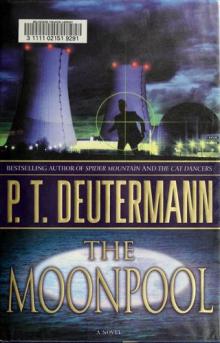 Cam - 03 - The Moonpool
Cam - 03 - The Moonpool Trial by Fire
Trial by Fire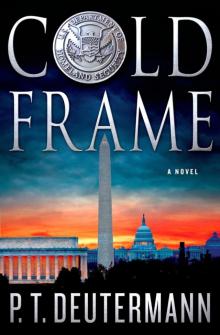 Cold Frame
Cold Frame Darkside
Darkside Cam - 04 - Nightwalkers
Cam - 04 - Nightwalkers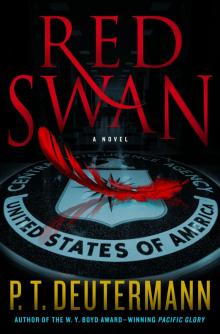 Red Swan
Red Swan The Commodore
The Commodore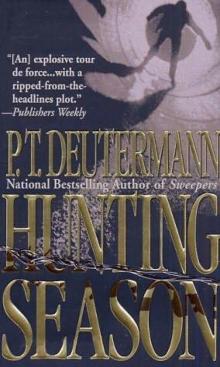 Hunting Season
Hunting Season The Cat Dancers
The Cat Dancers Scorpion in the Sea
Scorpion in the Sea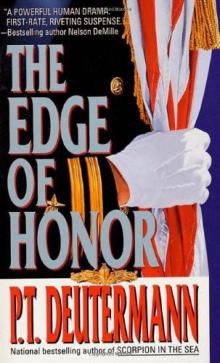 The Edge of Honor
The Edge of Honor The Cat Dancers cr-1
The Cat Dancers cr-1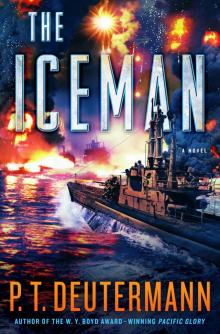 The Iceman
The Iceman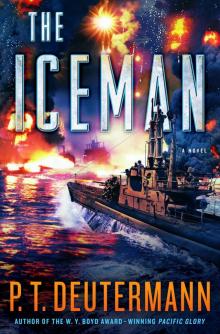 The Iceman_A Novel
The Iceman_A Novel Official Privilege
Official Privilege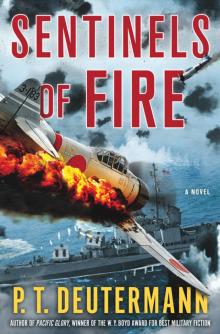 Sentinels of Fire
Sentinels of Fire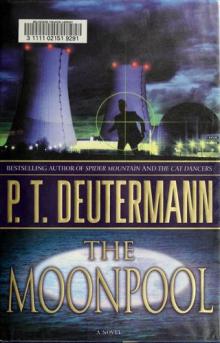 The Moonpool cr-3
The Moonpool cr-3 Nightwalkers cr-4
Nightwalkers cr-4 The Firefly
The Firefly Spider mountain cr-2
Spider mountain cr-2 Pacific Glory
Pacific Glory The Last Man
The Last Man